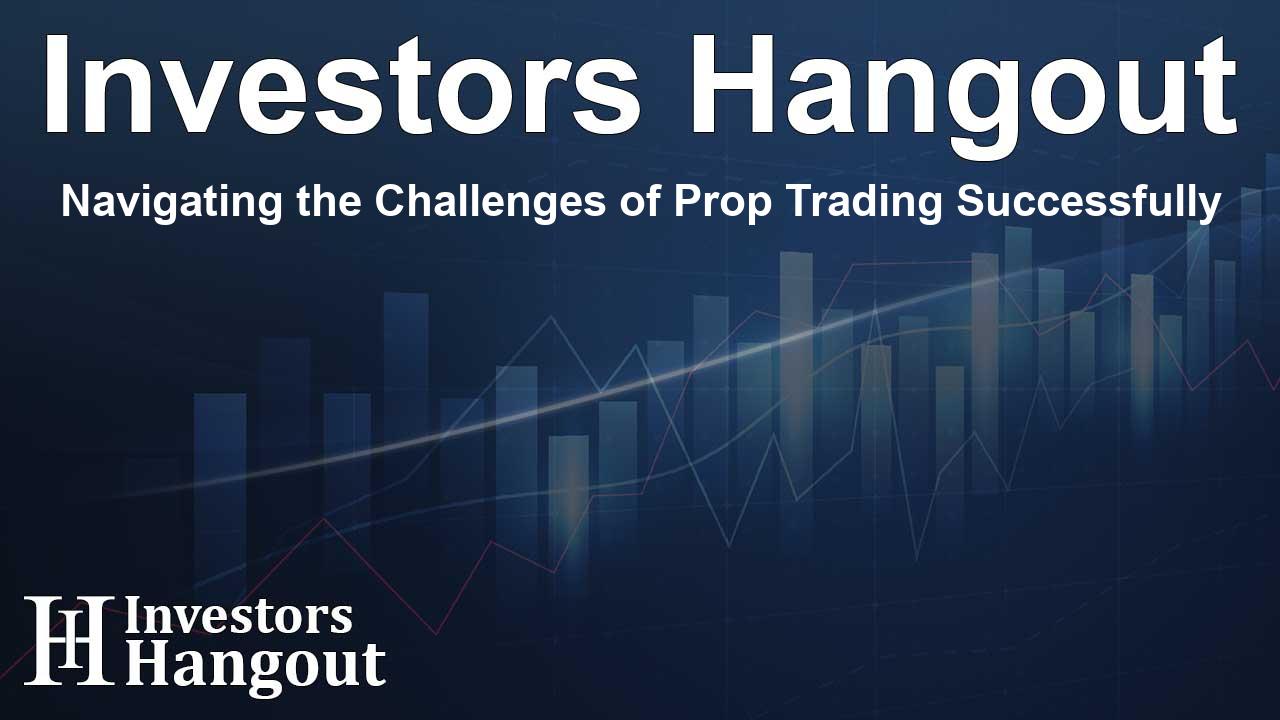Navigating the Challenges of Prop Trading Successfully

The High-Stakes World of Prop Trading
In the dynamic landscape of prop trading, traders face immense pressure to perform consistently. One pressing challenge that stands out is the crucial act of accepting a stop loss. Ignoring the necessity of taking losses can swiftly jeopardize a funded account or derail a prop firm challenge. When traders allow emotions to cloud their judgment and resist accepting losses, they often resort to reckless trading behavior, which can lead to disqualification or significant account drawdowns.
Understanding the Difficulty with Stop Losses
When operating as a proprietary trader, the combination of performance targets and strict drawdown limits creates a challenging environment for making sound decisions about stop losses. For many traders, placing a stop loss can feel like an admission of failure—an emotional barrier that deters them from acknowledging their position's downturn. Instead of accepting a loss, traders may cling to their positions, hoping for a market reversal. Unfortunately, this can exacerbate the situation, resulting in larger losses which further complicates adherence to the strict rules set forth by prop firms.
The Dangers of Revenge Trading
Many traders fall into the detrimental cycle of revenge trading after sustaining losses. In an attempt to quickly recover their losses and keep within the prop firm's limits, they often increase their position sizes unreasonably. This impulsive behavior invariably leads to further losses, significantly lowering their chances of passing the challenge or retaining their funded status. To combat this tendency, prop firms implement strict risk management protocols, aiming to prevent traders from acting on impulse and potentially ruining their accounts.
Overcoming Fear in Trading
Fear often creeps into a trader's decisions once they let emotions dictate their actions. This heightened fear can paralyze them, making them second-guess their strategies and hesitate to enter into trades, even those that align with their planned approach. Consequently, traders might miss out on valuable opportunities or enter trades too late, resulting in lost potential profits that could assist them in successfully navigating their prop trading challenges.
Strategies to Enhance Emotional Discipline
To excel as a funded trader and successfully navigate prop firm challenges, developing emotional discipline is essential. Here are several strategies to consider:
Develop a Solid Trading Plan: Craft a well-structured trading plan that includes defined stop loss parameters for each trade according to your strategy. Sticking to these predetermined levels is vital in helping keep your losses within acceptable limits.
Reframe Stop Losses as Protective Measures: Understand that losses are part of trading. View your stop loss as a protective measure that helps safeguard your capital and grants you a chance to regroup mentally.
Utilize Trade Copiers for Consistency: By using trade copiers, traders can execute consistent trades across multiple accounts which minimizes emotional swings. The focus shifts from chasing large profits to consistently following a solid trading strategy.
Implement Strong Risk Management Practices: Ensure that no more than 1-2% of your account is risked on any single trade. This approach allows you to manage risks effectively and ensures that a single loss won’t jeopardize your challenge or account.
Keep Emotions in Check: Tools such as journaling and mindfulness can be beneficial. Reflecting on trades can help you cultivate a calmer mindset, enabling you to execute your strategy without being swayed by emotions.
Accept Losses as Part of the Learning Process: It’s important to recognize that losses are an unavoidable aspect of trading. Acknowledging and moving past them swiftly can help maintain the necessary discipline to thrive in prop trading.
Implementing these strategies can greatly enhance your likelihood of success, making you the type of trader that prop firms prefer to fund. As traders refine their emotional discipline and risk management, they will find themselves better equipped to tackle the challenges of prop trading effectively.
Frequently Asked Questions
What is the main problem prop traders face?
The primary challenge for prop traders is accepting and executing stop losses effectively, which is vital to maintaining account health.
Why do traders struggle with stop losses?
Many traders perceive stop losses as a sign of failure, leading them to hold onto losing positions instead of managing their risks appropriately.
What is revenge trading?
Revenge trading occurs when traders increase their position sizes following losses in an attempt to recover quickly, often leading to more significant losses.
How can emotional discipline be improved in trading?
Improving emotional discipline can be achieved through strategies like developing a solid trading plan, using trade copiers, and practicing mindfulness.
What role does risk management play in prop trading?
Effective risk management is essential in prop trading as it ensures that excessive losses do not occur, allowing traders to adhere to drawdown limits and challenge requirements.
About The Author
Contact Dylan Bailey privately here. Or send an email with ATTN: Dylan Bailey as the subject to contact@investorshangout.com.
About Investors Hangout
Investors Hangout is a leading online stock forum for financial discussion and learning, offering a wide range of free tools and resources. It draws in traders of all levels, who exchange market knowledge, investigate trading tactics, and keep an eye on industry developments in real time. Featuring financial articles, stock message boards, quotes, charts, company profiles, and live news updates. Through cooperative learning and a wealth of informational resources, it helps users from novices creating their first portfolios to experts honing their techniques. Join Investors Hangout today: https://investorshangout.com/
The content of this article is based on factual, publicly available information and does not represent legal, financial, or investment advice. Investors Hangout does not offer financial advice, and the author is not a licensed financial advisor. Consult a qualified advisor before making any financial or investment decisions based on this article. This article should not be considered advice to purchase, sell, or hold any securities or other investments. If any of the material provided here is inaccurate, please contact us for corrections.
